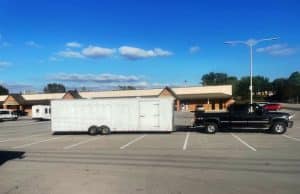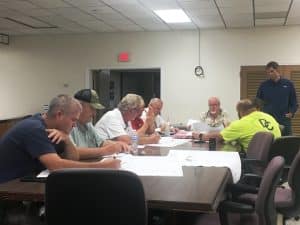News
Donations Needed Today (Wednesday) and Thursday for Hurricane Flood Victims in North Carolina
October 2, 2024
By: Dwayne Page
A local relief effort is underway today and tomorrow (Wednesday & Thursday) to collect supplies for hurricane flood victims in North Carolina.
Andy Estes is set up outside at the county complex to receive donations of supplies today (Wednesday) until 8:30 p.m. and Thursday from 6:30 a.m. until 3 p.m. at which time he will deliver the supplies to Cumberland Valley Nurseries in McMinnville to be transported to North Carolina.
Supplies needed include: Fuel/gas/diesel, water, baby formula-Similac, etc. ,baby wipes, diapers, pull ups, paper products, plates, cutlery, towels, cups, etc, tissue paper, female products, body products, deodorants, toothpaste, toothbrushes, pet food, underwear, socks for men and women, sanitizing wipes, gels, nonperishable foods, peanut butter, crackers, chips, canned food, tuna, chicken, pork n beans, hand can openers, bread, salt, pepper, sugar, ketchup, mustard, mayonnaise, over the counter medications, Tylenol, aspirin, band aids, and anything else you think might be needed.
Meanwhile, Salem Baptist Church in Liberty is seeking donations of non-perishable food items to help Storm Victims in East Tennessee. Donations will be collected at Salem Baptist Church in Liberty from October 5- October 10th Noon -6:00PM each day at the Fellowship Hall Drive Thru. Pull thru and drop off items just inside the door. If you have any questions email Pastor Jason Lohorn at sbcliberty@gmail.com
Local Folks Look to Volunteer for Flooding Victims
October 2, 2024
By: Bill Conger
People in DeKalb County are looking for ways to help their neighbors to the east after the flooding devastation from Hurricane Helena’s destructive path.
“We are working on getting at least one group of 15-20 people from local Baptist churches to send to East TN later this month, maybe even multiple groups,” says Aaron Young, Salem Baptist Association Disaster Relief Director.
“In a large disaster like what has happened in East TN, the TN Baptist Disaster Relief leadership coordinates with Federal, State, and local authorities on where the greatest needs are and setting up Incident Command Centers. Once that is done, groups of trained Disaster Relief volunteers, will coordinate with the TN Baptist DR leadership on when and where to deploy. DR volunteers will continue to come until there are no more people asking for help.”
Young says some good-intentioned people show up to help after disaster situations, but that desire to assist can actually back fire.
“As we saw when the tornado went through Cookeville a few years ago, when people show up to help but there is no coordination, it is actually a detriment,” Young says.
“Rogue groups would move piles of rubble from one side of the road to another, and another group would come the next day just to move it back to the spot it was before.”
Young says the best and most efficient way to help with donating items is to give directly to Baptist Disaster Relief. He says in that way it can be used on what is needed. You can go to tndisasterrelief.org.
“Anyone wanting to volunteer their time can go to the same website and get set up to be trained to be able to go on Disaster Relief callouts,” Young says. “If you are a member of a Baptist church within the Salem Baptist Association, you can email me at aaronyoung6565@gmail.com and there is a volunteer waiver form that you can fill out to be able to go with other DR trained volunteers.”
The County Powers Act with “Distance Requirements”?
October 2, 2024
By: Dwayne Page
Taking another look at the “County Powers Act”
During its regular monthly meeting Monday night, the DeKalb County Regional Planning Commission, without taking a vote, came to a consensus in asking the county commission to renew efforts to adopt the County Powers Act with a “distance requirement” going forward in the interim modeled after a Grundy County plan. The planning commission will later consider establishing a plan for county-wide zoning. The next step in the process is for the county’s Health, Education, and Public Welfare Committee to meet regarding the County Powers Act on October 10 at 6 p.m. in the courthouse to possibly come up with a recommendation for the county commission to consider.
While the County Powers Act exempts certain businesses and practices from local regulation such as surface mining activities, etc. covered by environmental protection laws, County Attorney Hilton Conger has learned that Grundy County has established a 5,000-foot distance requirement in its County Powers Act which means no quarry or other undesirable identified land use can operate within 5,000 feet of a residence, etc. Conger shared what he learned with the planning commission Monday night.
“Grundy County passed the County Powers Act with a resolution that said you cannot have a quarry, landfill, adult entertainment, and I think there were five or six other land uses that were within 5,000 feet of a residence. That’s almost a mile,” said Conger” You won’t find a place anywhere that is not within 5,000 feet of a residence, church, school, park, or hospital and places like that. I think it’s a good place to start. That is something that could happen relatively quickly. You could enact it and pass an ordinance,” said Conger.
While a distance requirement for DeKalb County modeled after the Grundy County plan may be an immediate solution, Conger cautioned that Grundy County is facing a legal challenge.
“The people that wanted to put in the quarry filed suit in the Chancery Court of Grundy County and the Chancellor there upheld that ordinance. They can regulate distances,” said Conger. “It went to the Court of Appeals, and it upheld that. Its in the Supreme Court right now so the jury is still out as to whether that is going to be the law once and for all,” Conger explained.
Outside the four cities, the county currently has no zoning or other regulatory authority to prohibit, limit, or oversee development of any land uses including for quarries, data mining, cell towers, pallet yards, junk yards, etc.
To enact the “County Powers Act”, the county commission must adopt a resolution by two thirds vote as well as a resolution to establish and enforce regulatory standards regarding health and safety conditions of residential and non-residential properties within the confines of DeKalb County outside the boundaries of the municipalities which already have codes and ordinances.
The “County Powers Act” issue had not been addressed since last August until residents in the Snow Hill Community recently discovered that a rock quarry operation had moved into the neighborhood without their knowledge, and they came to the county commission in September to complain about it. More recently residents in the Liberty and Alexandria area learned that another company is planning to develop a rock quarry in their community. Since then, neighbors just beyond the southern border of the Smithville city limits have been told a data processing center is planned to soon begin operation which could generate excessive noise.
While the planning commission has not given up on the idea of zoning for DeKalb County, the process takes much longer to adopt than the County Powers Act.
“In Cannon County it took five years. I don’t think it would take five years here because they (Cannon County) were in no hurry. They took their time. I feel like a reasonable, general timeline is 12-18 months for zoning,” said Tommy Lee, Director of the Upper Cumberland Development District, who serves as UCDD staff planner and advisor to DeKalb County. “With the County Powers Act you can target what businesses or uses you want to regulate. With zoning you regulate all land uses and with zoning every parcel in DeKalb County is going to be zoned something outside the city limits of your four cities. And if it has the word agriculture associated with it anywhere it is not subject to zoning,” Lee explained. “Chicken houses and things of that nature more than likely you couldn’t zone it. It’s a state law. You can’t regulate any kind of agriculture,” he said.
“Commercial structures in Cannon County were zoned commercial. Industrial buildings were zoned industrial, and any large residential neighborhoods were zoned residential. Everything else was zoned agriculture. The only permitted uses in the agricultural zone were single family residential and agriculture uses. Any other use with a use permitted upon appeal had to come in front of a board,” said Lee.
“State law requires that zoning comes from this board (planning commission) because zoning affects everyone,” explained Lee. “Cannon County has a building inspector/codes enforcement officer, and they had to come up with ways to generate revenue to pay for that. They charge a $400 application fee for any and all subdivisions and $75 per lot. A two-lot subdivision in DeKalb County costs $150. In Cannon County that same plat costs $550. They also have local building permit fees which are in addition to the state fees you pay,” Lee explained.
During the public comment period, Mike Antoniak, one of several concerned citizens at the planning commission meeting posed a question. “What’s the quickest way to know what’s coming? Identifying what are the threats to the way we live. Quarries, the burning of pallets, adult entertainment and data centers are a real threat. If you identify those businesses, you could say to them you have to come before the county to get compliance. At least we are aware,” said Antoniak.
“Zoning requires that all multi-family, commercial, and industrial uses submit a site plan,” Lee explained. He added that site plans might also be required under the County Powers Act, but he was less certain about that.
Planning commission member Jack Barton said the county needs to at least pursue the County Power’s Act in the short term and then look at zoning.
“As a former (county) commissioner I have heard enough to say the County Powers Act needs to be pursued because its a more expedient route. He (Lee) asked me the question today if we took the quarry on Snow Hill out of the equation would I still be in favor of zoning? I think I’ve heard enough about rural counties being hood winked or people trying to take advantage of cheap taxes to come in here to put a landfill. Trash is a big thing, and we don’t want somebody coming in here to have a big landfill and there’s any number of land uses that we want to try and protect our pristine county from if we can,” said Barton. “The county commission has been upset because there has been 60 or 70 of you concerned about the quarry but believe me if you try and start voting on zoning there will be thousands of people at the meetings worried about what it means to their property and what is going to happen and that’s why it takes 12-18 months because it’s a very deliberative process,” he said.
Planning commission member Greg Matthews took a different view. “We can sugar coat it. We can hide it behind landfills and rock quarries, but it is still the county telling you what you can do with your property”.
When the planning commission meets again on December 9, Lee said he will “bring a copy of the Cannon County zoning resolution for you to look it and we will start going through it,” he said.
The idea behind the “County Powers Act” is to prevent or eliminate dangerous and or unsanitary conditions resulting from overgrown vegetation, accumulation of debris, trash, litter, and garbage, or the presence of vacant dilapidated buildings or structures. Although DeKalb County currently has no zoning regulations in place, the “County Powers Act” gives counties, without establishing zoning, the authority to set and enforce standards for county property owners with respect to nuisances and other practices deemed detrimental to their neighbors.
However, according to the County Technical Assistance Service (CTAS) website, there are limitations under the “County Powers Act”.
“The law exempts certain businesses and practices from regulation. The powers conferred upon counties by T.C.A. § 5-1-118(c) do not apply to the following activities which are regulated under other provisions of general law: sale of beer and alcoholic beverages; wholesale of beer; surface mining; production of oil and gas; activities covered by environmental protection laws and regulations dealing with air pollution, atomic energy, solid waste disposal and management, landfills, hazardous waste management, petroleum underground storage, oil spill cleanup, dry-cleaning, water, wastewater and sewerage; water management; wells; and dams. Additionally, T.C.A. § 5-1-118(b) provides that counties may not use these powers to prohibit or regulate normal agricultural activities”.
« First ‹ Previous 1 67 75 76 7778 79 87 177 2493 Next › Last »











